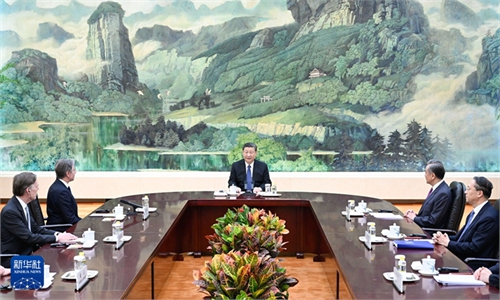China’s sincerity and goodwill in promoting China-US ties fully demonstrated, will the US cherish it?

Illustration: Chen Xia/Global Times
US Secretary of State Antony Blinken concluded his visit to China on April 26. This visit represents a concrete step for both China and the US to implement the San Francisco consensus reached by leaders from both sides to maintain dialogue, manage differences, promote cooperation and strengthen coordination on global affairs.
The year of 2024 marks the 45th anniversary of the establishment of China-US diplomatic relations. Despite facing grave challenges in China-US relations since the Donald Trump administration, China, with a strong sense of responsibility to build a shared future for mankind, has made great efforts to stabilize and improve the bilateral relationship and implement the consensus reached at the San Francisco summit.
To begin with, through high-level courtesy meetings, China has clarified its position and provided guidance on China-US relations.
The Chinese side noted that China and the US should be partners rather than rivals, help each other succeed rather than hurt each other, seek common ground and reserve differences rather than engage in vicious competition, and honor words with actions rather than say one thing but do another. These four points are important inspirations drawn from the past 45 years of diplomatic ties. Mutual respect, peaceful coexistence and win-win cooperation, as the three overarching principles for the relationship, are both lessons learned from the past and a guide for the future.
Besides, during the five-and-a-half-hour meeting between Chinese Foreign Minister Wang Yi, also a member of the Political Bureau of the Communist Party of China Central Committee, and Blinken, Wang made clear China's position on major issues related to China's core concerns, including strategic perception, Taiwan, trade and technology, the South China Sea, and the US Indo-Pacific Strategy.
Strategic perception is about whether China and the US should be partners or rivals, and it is of fundamental importance to the relationship. In other words, the future direction of China-US relations depends on whether the US is willing to meet China halfway in terms of strategic understanding. If the US acknowledges China's positive gestures and takes practical actions to meet China halfway, the bilateral relationship can stabilize and enter a new stage of positive development. However, if the US ignores China's goodwill and sincerity, disregards China's legitimate interests and concerns, and continues to pursue inappropriate policies that will cross China's clearly stated red lines and bottom lines, then the negative impact on China-US relations and the world will be the responsibility of the US.
The Taiwan question is the first red line in the China-US relationship that must not be crossed. The premise of any discussion over the Taiwan question between China and the US is that Taiwan is part of China and the Taiwan question is purely China's internal affair. The reason why such a discussion takes place is because the US interferes in China's internal affairs.
Furthermore, China has made practical arrangements to address specific concerns raised by the US.
The fentanyl issue is of great concern to the US side. It is not a problem caused by China, however, China is not standing idly by and is willing to offer assistance to the American people. Following the spirit of the San Francisco vision, China arranged a meeting between Chinese State Councilor and Minister of Public Security Wang Xiaohong and Blinken in Beijing, where an exchange of views took place on promoting bilateral cooperation in terms of both drug control and law enforcement. Other relevant, substantive and constructive meetings have also been held, which further demonstrate China's tremendous efforts, sincerity and goodwill in improving ties with the US.
With China's efforts, during Blinken's visit, the two sides reached consensus on the following five aspects:
First, the two sides agreed to continue their efforts to stabilize and develop China-US relations under the guidance of the two presidents. Second, the two sides agreed to maintain high-level interaction and engagements on various levels. Third, the two sides announced that the first meeting of the inter-governmental dialogue on artificial intelligence will be held. Fourth, the two sides will take steps to expand people-to-people exchanges, and welcome students from each other's countries. Fifth, the two sides will maintain consultations on international and regional hotspot issues and strengthen communications between the special envoys of the two countries.
The five consensus cover all aspects of China-US relations from macro guiding principles to specific practical cooperation. The willingness of the Chinese side to reach these five consensus with the US side in the current context of China-US relations has fully demonstrated China's sincerity and goodwill, showing the greatest efforts made by China to maintain and safeguard the stability and improvement of bilateral relations. The US side should cherish this. If the US side can truly feel China's sincerity and goodwill, and have the strategic courage and political responsibility, there is reason to cautiously expect that this year China-US relations will see more positive changes conducive to stability, recovery and healthy development.
The author is director of the Research Institution for Global Cyberspace Governance at Fudan University. opinion@globaltimes.com.cn

